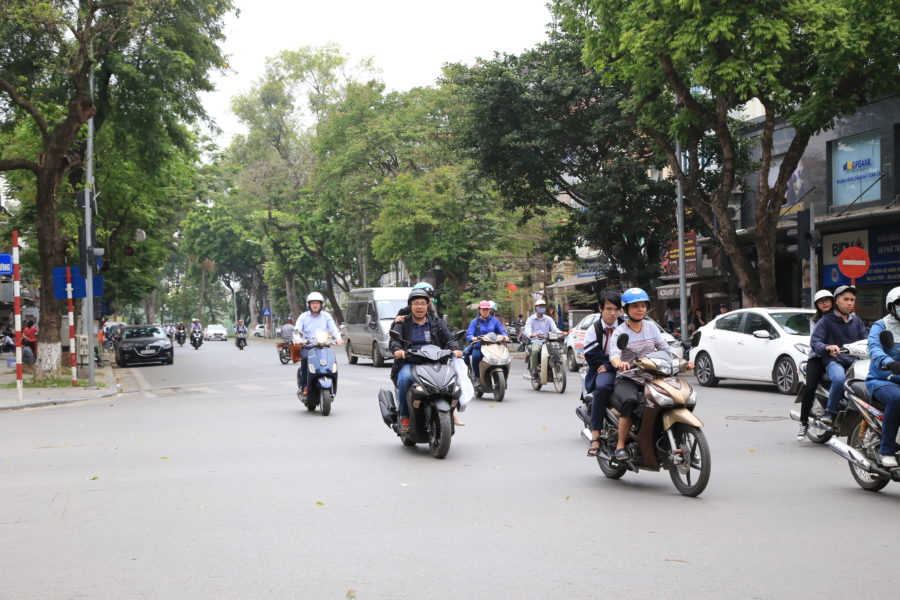People sometimes ask me which part of my job I enjoy the most, and which is the hardest part.
For both questions, the answer often relates to our role in providing consular services to British people overseas. I get a particular sense of professional satisfaction when our consular teams in Hanoi or HCMC are able to help a Brit who is in trouble, or resolve some issue that makes a real difference to people’s lives – for example, when we were able to solve a stand-off over official documentation which might have stopped British couples from adopting children in Vietnam. And certainly no part of the job is sadder than when we need to provide consular assistance following the death of a British national, especially where we need to support his or her family.
The volume and complexity of our consular work in Vietnam is growing every year, as more and more Brits come here on holiday, or to work. The number of British visitors in 2016 was up nearly 20% on 2015, and I expect it to be a similar story this year. According to Vietnamese statistics, Vietnam receives more visitors from the UK than from any other EU country: nearly 250,000 in 2016. The Vietnamese government’s decision to waive visa requirements for one-off visits of less than 15 days has undoubtedly contributed to that. And we are also seeing more Brits living and working here, whether in business or teaching English.
The vast majority of British people who visit or live here have a wonderful time, and will leave with fantastic memories of Vietnam’s scenery, culture and food. But unfortunately, a small minority will encounter problems of some description: crime, serious illness, accidents on the road or while engaged in adventure tourism.
That is when our excellent consular teams swing into action. And with the overall number of Brits in Vietnam growing, the number of such cases that they have to deal with is growing also. This is demanding work, requiring a high degree of professionalism and efficiency, but also the ability to show empathy and support to those who may be seriously distressed, or may expect things that we simply can’t do (like get someone out of jail). It means a lot to me and my colleagues when we hear that we’ve got it right – and where we haven’t, we always try to understand why and learn the lessons for next time.
As in other countries, the wider context for how we do consular work in Vietnam is the Foreign Office’s global consular strategy, which covers the period through to 2020. Two of the key principles which will shape our approach for the next few years are:
- helping British citizens to avoid trouble in the first place by providing better information and advice, and tackling at source some of the issues which often land people in trouble. For example, in Vietnam, a number of young Brits have lost their lives in motorbike accidents in recent years. We want to do more to remind people that if you plan to ride a motorbike here, you need to be properly licensed and insured, understand local traffic conditions, and follow the rules, such as wearing a helmet and not driving after drinking.
- prioritising assistance to those who most need our help – victims of serious crime, including sexual assault, or those who are hospitalised or arrested – while encouraging British people to take responsibility themselves for the basics of travelling, living and working overseas safely: having the right insurance, looking after your passport, or, if you are living here, knowing how to access local services. Part of this is about investing the time to build strong relationships in advance with local authorities in areas where large numbers of Brits live or visit. So that if anything does go wrong, we’ll be more likely to get the information and assistance we need, quickly and effectively.
I’m sure most people would agree that these are sensible aims. But in order to be able to focus more effort on these areas, we’re changing some other aspects of the service we provide. So, from 13 November, we will no longer legalise documents at the Embassy in Hanoi and the Consulate General in Ho Chi Minh City; instead, British nationals will need to get any official documents they are required to present in Vietnam (such as University degrees, teaching certificate, police check, etc.) legalised by the FCO Legalisation Office in the UK, and by the Vietnamese Embassy in London. Importantly, this will also bring us into line with official Vietnamese requirements.
Understandably, this change won’t be popular with everyone. There is no denying that for some people, it will make the process of legalisation more time-consuming and expensive. Therefore, we’ve planned carefully for it, and are confident that the new arrangements for getting your documents legalised will work, whether you’re based in Vietnam already or still in the UK.

